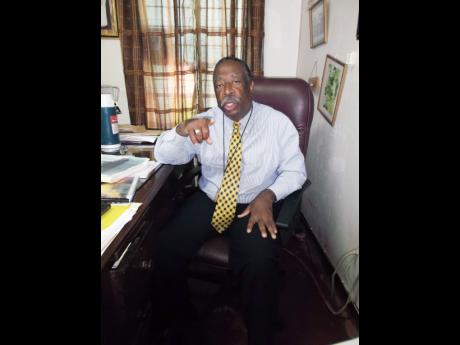Bailiffs being put out of business by touts in the street
The Office of the Bailiff of Kingston and St Andrew now faces possible closure as touts are putting it out of business.
The bailiffs have to compete with persons who flock the courtyard and approach prospective litigants as they come to file suits at the civil division of the Resident Magistrate's Court.
"Good morning, can I assist you with your business today," said one of the 'vendor bailiffs' as The Sunday Gleaner visited the area recently.
Litigants who do not understand court procedures are very happy for the help and so they outline their business and get the necessary help and guidance.
But one of the problems the official bailiffs are having is that the assistance by the vendors, who are their competitors, is not for free. The help comes with hefty charges, particularly to serve the summonses when the cases are filed.
Augustus Sherriah, the head bailiff, told The Sunday Gleaner last week that hundreds of summonses are prepared in the courts office on a monthly basis but his office only receives about 90 summonses each month to serve.
"Touts flock the courthouse daily, filing summonses on behalf of persons who attend the courthouse. Some of them have documents for power of attorney written up, which they give to the persons, and once they sign them, they now become the vendor bailiffs' clients. The touts take over the process and file the documents and serve the summonses themselves on the persons who are being sued," Sherriah explained.
The bailiff's office charges $1,000 to serve a summons but Sherriah says the 'touts' charge much more than that, some even asking for as much as $6,000.
"I have to abide by the tariff of fees which is gazetted because my office is governed by the law," Sherriah said. "There are many cases in which default judgments are entered because some of the summonses which the touts undertake to serve are not served personally and they come back endorsed as being served," he said.
The court bailiffs collect fees based on the government's scale of fees but some vendor bailiffs charge between 35 and 40 per cent of the debt to be collected.
MONEYBEFOREJOB
Sherriah said some of them even demand their money before they do the job.
Sherriah referred to a case involving an 80-year-old woman who came to court and sued a tenant who owed her $40,000. He said a vendor bailiff tricked the lady by suing on her behalf and took the entire $40,000 for his fees.
A vendor bailiff is granted a licence under the Hire Purchase Act, but such a licence, according to Sherriah, is to be used for breaches of hire purchase agreements.
"The licence should never be used to take away the functions of court bailiffs," Sherriah said.
"Some people believe this office is a salt fish shop where they can take over the functions of the bailiffs because they are not aware of the magnitude of duties we have to perform," he added.
There are five clerical staff and 13 assistant bailiffs on staff, and Sherriah said the bailiffs are not being paid adequately.
It costs $208,000 monthly to pay the clerical staff but Sherriah said he was not getting summonses to serve.
"So if we are not getting the summonses to serve, then very soon this office will have to be closed because there will be no money to pay them, " he said.
Although the bailiffs office is governed by the Judicature (Resident Magistrates) Act and the Judicature (Supreme Court) Act, Sherriah said the office is not an agent of the State because they are regarded as independent contractors.
Sherriah disclosed that when suits are filed against him, he has to find the money to pay lawyers to defend him.
He said suits are filed against him at times when he is carrying out his legal duties based on orders from the court. He said if a court order is irregular and his office acts on that order, then he is the one who is sued.
"The bailiff system needs a complete overhaul," said Sherriah, who has been a bailiff since 1982.
He sees the happenings at the courthouse as a complete free-for-all because in other countries people cannot just flock a courthouse "carrying out the duties of a bailiff without approval or certification".
Sherriah is now calling for the relevant authorities to take a keen interest in the plight of the court bailiffs to ensure that things are done according to the law and litigants are not ripped off by the touts.

